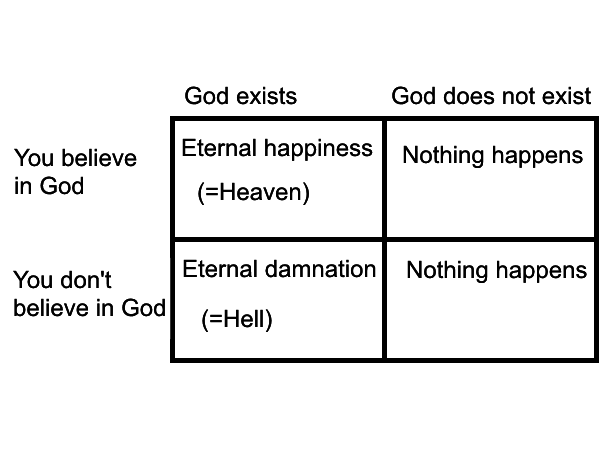When I was a senior in high school, my school started offering a dual credit philosophy class; for $100, we could get three college credits for taking a class that 1) substituted a history elective I didn’t want to take anyways, and 2) gave me credits for a mere tenth of the price I’d pay for them at the average postsecondary institution.
Obviously, I signed up for the philosophy class.
Although not much of the information I learned in this “Principles of Morality” class – or honestly many of my other high school classes – stuck incredibly well, there is one philosophical concept I still think about from time to time: Pascal’s Wager.
For those who are unfamiliar with Pascal’s Wager, it is a simple-looking grid that displays the four possible outcomes human beings are presented with when they wager that God exists or does not exist.
Basically, his argument is that, despite the hundreds of nuanced religions that exist, there are ultimately only four end-of-life possibilities for every human on earth:
- If God exists and you believed in Him, you will have some form of eternal happiness.
- If God does NOT exist and you believed in Him, nothing happens.
- If God exists and you did NOT believe in Him, you will suffer some form of eternal punishment.
- If God does NOT exist and you did NOT believe in Him, nothing happens.
Possibilities #1 and #3 are pretty self-explanatory, and it is frankly not my place to comment on each religion’s beliefs on the nuanced possibilities for eternal happiness, eternal damnation, etc. Besides, that is much too detailed of a topic to focus on in a 500-word article.
What I prefer to think about (and now write about) are Pascal’s proposed outcomes in scenarios #2 and #4…“Nothing happens.”
Nothing. happens.
(See, I am even repeating this two-word phrase in its own paragraph because that’s just how mind-boggling and dramatic of a concept I find it to be.)
It seems simple to say, but really think about that…Pascal is pointing out the fact that if God, Allah, reincarnation or whatever else does not exist, then simply nothing awaits us when we die.
Eternal black nothingness… yikes.
Furthermore, in making this square, Pascal is arguably trying to say there can be no negative consequence to believing in a god in your time on Earth. Either you get to go to heaven, or you die and nothing happens.
Neither of those options is necessarily bad. Plus, both of those possibilities sound a hell of a lot better than…well, hell.
Right?
Although many people agree with this principle (as shown by the billions of Earth-dwelling individuals who choose to be religious), others would argue that spending your life worshiping a god that potentially doesn’t exist is too much of a waste of time to be worth it.
Perhaps those individuals would revise Pascal’s outcome #2 to say: “If God does NOT exist and you believe in Him, nothing happens…but you basically wasted your life.”
To many people, this is the base argument as to why not to “waste” your time following the principles of a God that we cannot prove exists. My follow-up question to that is, is it really that wasteful to live a moral life?
Is it a “waste” to spend your life being selfless, working to love your neighbor? Aren’t practices such as prayer and meditation scientifically proven to help people feel more happy and content in their life, regardless of if a god exists in the heavens or not?
As you can see, despite Pascal’s Wager looking like some type of harmless excel spreadsheet homework assignment, it presents a multitude of fundamental questions meant to challenge us humans to make a well-informed choice on whether or not to buy into the whole “religion” thing during our limited stay on Earth.
I hope we place our bets wisely. The stakes are awfully high to be making the wrong choice…
Or perhaps the stakes are nothing.







